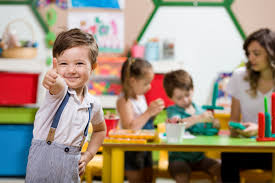What is self-esteem?
When we talk about self-esteem, we’re referring to the way children perceive and value themselves. It encompasses their beliefs about their abilities, worth, and overall self-image. In the world of preschoolers, self-esteem lays the foundation for their emotional well-being and sets the stage for future success in various aspects of life.
Factors Influencing Self-esteem in Preschoolers
- Preschoolers’ self-esteem is shaped by a combination of factors, including their family environment, peer interactions, and the role of their teachers. Within their families, the love, support, and encouragement they receive are crucial in nurturing their self-esteem. Positive interactions with siblings and parents, as well as consistent praise for their efforts, can significantly contribute to their growing sense of self-worth.
- As our children grow, it can be increasingly difficult as parents to watch them venture out into the big wide world and take on new experiences in social settings. Sometimes they will be met with victories of inclusion and an awesome playtime, and other times rejection and disappointment could arise. Peer interactions become increasingly important during the preschool years. Positive experiences with friends and classmates help children develop social skills, gain acceptance, and feel a sense of belonging. On the other hand, negative experiences, such as teasing or exclusion, can impact their self-esteem negatively. It’s all part of the rise and fall of growing up, and as parents and caretakers, we can be there for each moment to offer support and encouragement.
- Teachers play a vital role in fostering self-esteem in preschoolers. By providing a safe and inclusive learning environment, such as those offered at Rising Stride Child Care Centers, teachers can encourage children to explore their abilities, celebrate their accomplishments, and learn from their mistakes. The teacher’s guidance and support can help children develop a positive self-perception and a belief in their own capabilities. What a relief for parents, right? Knowing that your child is in the hands of caring adults who are fully trained to help your preschooler navigate these situations in a healthy way that will benefit their future is a true gift.
Understanding these factors allows us to recognize the significant influence we have as caregivers, parents, and educators in shaping our preschoolers’ self-esteem. By being mindful of these influences, we can create an environment that promotes healthy self-esteem and empowers our little ones to thrive.
Signs of Positive Self-Esteem in Preschoolers
Do you ever watch your child at the playground and wonder what they are feeling? They may be surrounded by a mix of peers that seem to be showing strong signs of confidence, shyness, or happiness, and your child may be seemingly in their own little world. Positive self-esteem in preschoolers does not always look the same, which is why we’ve curated some of the signs of positive self-esteem in the preschool age group. If you notice these signs in your child, then you more than likely have a kiddo with positive self-esteem on your hands.
Confidence in expressing thoughts and feelings
Preschoolers with positive self-esteem are more likely to express their thoughts, feelings, and needs with confidence. They feel secure in sharing their ideas and opinions, knowing that their voice matters. Whether it’s speaking up during circle time or confidently engaging in conversations with peers, their self-assurance shines through.
Willingness to try new activities
When children have a healthy self-esteem, they exhibit a sense of adventurousness and a willingness to explore new things. They approach unfamiliar activities or challenges with enthusiasm and curiosity, embracing the opportunity to learn and grow. They understand that it’s okay to make mistakes and view setbacks as valuable learning experiences.
Ability to handle mistakes positively
Children with positive self-esteem have the resilience to handle mistakes and setbacks in a constructive manner. Instead of becoming discouraged or disheartened, they view mistakes as opportunities for growth. They are more likely to persevere, problem-solve, and seek help when needed, understanding that setbacks do not define their worth or abilities.
Strategies for Building Positive Self-Esteem
Each interaction and activity we engage in with our preschoolers is an opportunity to nurture their self-esteem and help them blossom into confident, resilient individuals. By offering love, support, encouragement, and a safe space to explore their abilities, we empower them to embrace their uniqueness, handle challenges with confidence, and value their own self-worth.
These formative years in our children’s lives are what will help them grow into confident young adults who feel loved and supported in their decision-making. Guiding them through challenges and encouraging them to find creative solutions will improve their problem-solving and resilience, which they can take with them into adulthood.
We hope that after this post, you feel prepared and encouraged to create nurturing environments, embolden healthy peer interactions, foster growth mindsets, and celebrate each child’s individuality. Together, we can help our preschoolers thrive, believing in themselves and their limitless potential.

